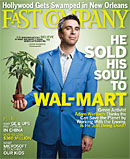 The cover story in the latest issue of Fast Company is a long chin-scratcher about enviro-wunderkind Adam Werbach’s decision to go to work for Wal-Mart. Is he selling out? Is he part of a new wave of more pragmatic environmentalism? Will he change Wal-Mart or will it change him?
The cover story in the latest issue of Fast Company is a long chin-scratcher about enviro-wunderkind Adam Werbach’s decision to go to work for Wal-Mart. Is he selling out? Is he part of a new wave of more pragmatic environmentalism? Will he change Wal-Mart or will it change him?
The article references (though does not, ahem, cite the source) an essay from John Sellers and Barbara Dudley called “The Death of Integrity,” which takes the "Werbach’s a sellout" position. On the flip side, the article also references Hunter Lovins calling Werbach’s get-inside-the-beast strategy "absolutely world-changing brilliant."
Eh. I can’t seem to work up much angst about this. Werbach, like the other "mavericks" associated with the Death of Environmentalism hubbub, seems to think about himself enough to cover for the rest of us. He’s just a guy at a company, and in the end, this is just a human-interest angle on the same old question: is Wal-Mart "really" going green?
That question produces lots of heat but little light. On one hand, the company has convinced lots of otherwise skeptical folks that it is genuinely committed to making Wal-Mart, as the story puts it, "as well known for environmental sustainability as Target is for everyman design." It’s certainly got the power to create considerable change. On the other hand, Wal-Mart is intrinsically part of the Capitalist Corporatist Pony-Killing Patriarchy. If you object to the CCPKP on fundamental grounds, there’s not much Wal-Mart could conceivably do to win you over. And so it goes. (If you’re interested, I did an op-ed on it here.)
I will say this, though. What Werbach’s chosen to focus on within the company strikes me as fairly bizarre. It’s called the Personal Sustainability Project (PSP), and as far as I can tell it’s a self-help program for Wal-Mart "associates." They’re pulled into sessions where each is encouraged to do "one thing" to make their life more sustainable — get out of debt, quit smoking, whatever. My initial reaction was much like this guy’s:
"Someone with [Werbach’s] kind of brain who has been called a wunderkind is now doing a hybrid between Jenny Craig and SmokEnders for Wal-Mart," says John Sellers, who heads an activist group called the Ruckus Society, a former Act Now client.
If I were a Wal-Mart "associate," I think I would respond to such suggestions by asking if I could have, say, better health care benefits. That would increase the sustainability of my life. Literally!
Maybe by putting these kinds of concerns before Wal-Mart employees, a small group at a time, Werbach can take the political edge off them and make them mainstream. Maybe he can create a grassroots movement for sustainability in the heartland. Still, these seem like tiny, ambiguously effective steps, especially with the power of the world’s biggest retailer at your disposal.


